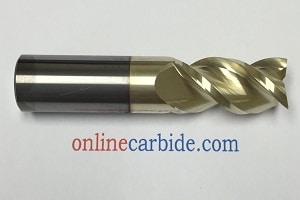Making the transition from traditional machining to high-performance machining can be a daunting task, but it can pay huge dividends in terms of increased productivity and profitability. There are many steps one should take to increase competitiveness in this field. Multiple-axis tools, better tool and workpiece holders, enhanced sensor systems, and newer CAD software are among the most important. But if productivity is the goal, making the switch to carbide drills should be at the top of your list.

Here are five reasons why:
1. Carbide drills are much more durable than traditional steel or HSS drills, meaning they will last longer and can be used for more applications. While a fresh steel tool can be sharper, they lose that sharpness relatively quickly, which causes them to work less efficiently and yield rougher finishes that require additional polishing operations.
2. Carbide is also harder than steel or HSS, so it can drill through tougher materials such as stainless steel or cast iron. Even when machining gummy materials like aluminum, carbide drills can be driven more aggressively, increasing metal removal rates and feed rates many times over.
3. Carbide drills also have higher heat resistance, meaning they can be used for drilling at high speeds without fear of damage. This is especially important when machining non-ferrous metals, which tend to heat up quickly. Carbide is a composite material made of tungsten and carbon, so it can withstand extreme temperatures without breaking down and dissipate heat more effectively than steel or HSS.
4. The wear resistance of carbide also results in reduced friction and greater chip evacuation, as the chips are less likely to adhere to the tool. While engaging the material, carbide transfers heat to the chips more effectively, which makes them easier to break up and remove from the hole. This is a huge benefit when drilling deep holes, as it prevents the tool from getting gummed up and breaking.
5. Carbide drills are also more resistant to chemical attacks than their steel or HSS counterparts. This is especially important when machining materials that contain sulfur or chlorine, as these can cause corrosion and pitting.
7. Carbide drills are also less likely to fail than traditional steel or HSS drills, making them safer to use. This imbues them with incredible versatility and makes them a favorite when boring or tapping through hard-to-machine materials. Carbide tends to last up to ten times longer than steel tools.
8. Finally, carbide drills are generally more accurate than traditional steel or HSS drills. This is due in part to their hardened construction and rigidness. Unlike their steel counterparts, carbide tools are not flexible, preventing them from wobbling or walking off when engaging the material, giving machinists increased chances of staying true to print. Carbide tools retain their properties even at high speeds and temperatures, so they can remain engaged for longer periods and yield higher feed rates without interrupting the cutting process.
In conclusion, just by switching to carbide cutting tools, your workshop will be able to take on tougher projects, work with increased accuracy, and do so much more efficiently. The results will be increased productivity, profitability, and a newfound competitive edge. So if you’re looking to take your machining operation to the next level, carbide drills should be at the top of your list.
However, you must make sure you buy carbide drills from reputable and experienced manufacturers who can guarantee uniform and reliable tools at the best prices. Online Carbide is a tool manufacturer located here in the United States, specialized in crafting high-quality carbide tools at competitive prices. Visit their website today to learn more about their premium carbide cutting tools.
For more information about End Mills For Aluminum and TiAlN Coated End Mills Please visit: Online Carbide.
Hi, I am Adam Smith, Admin Of TechSketcher, Creative blogger and Digital Marketer.